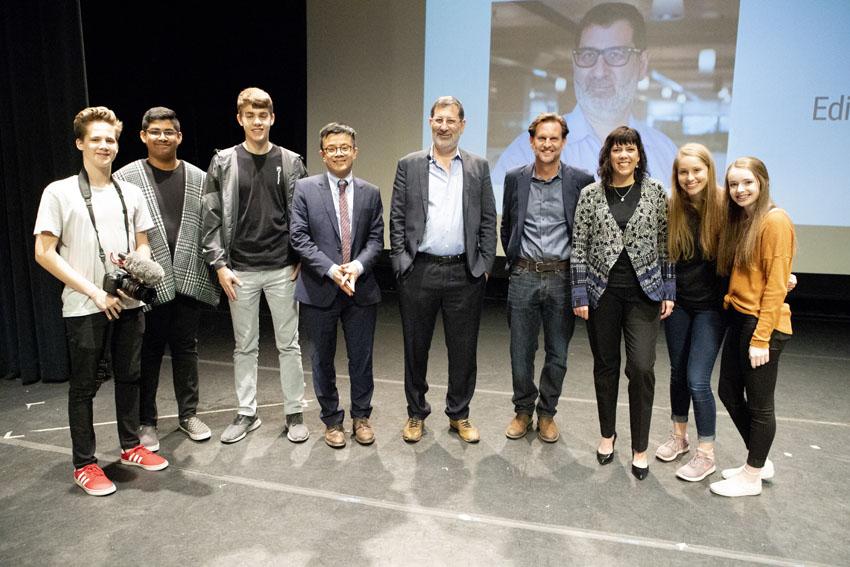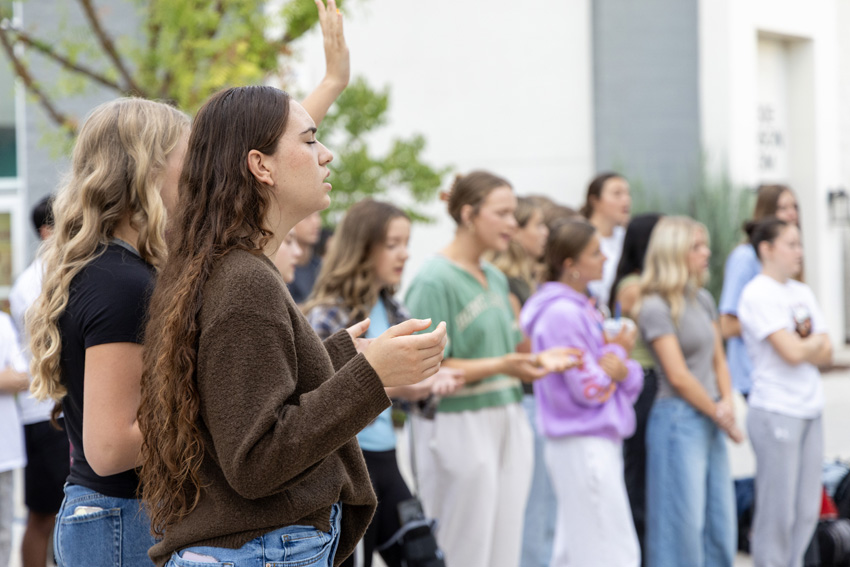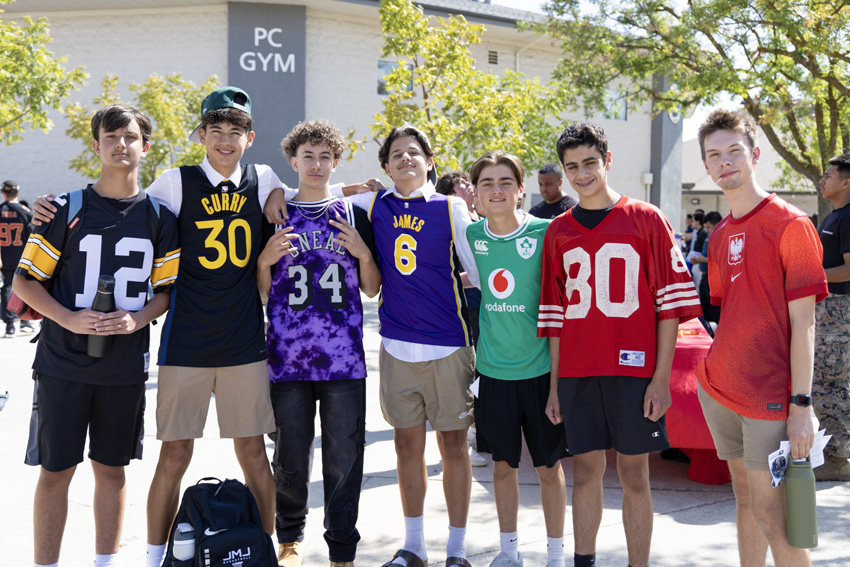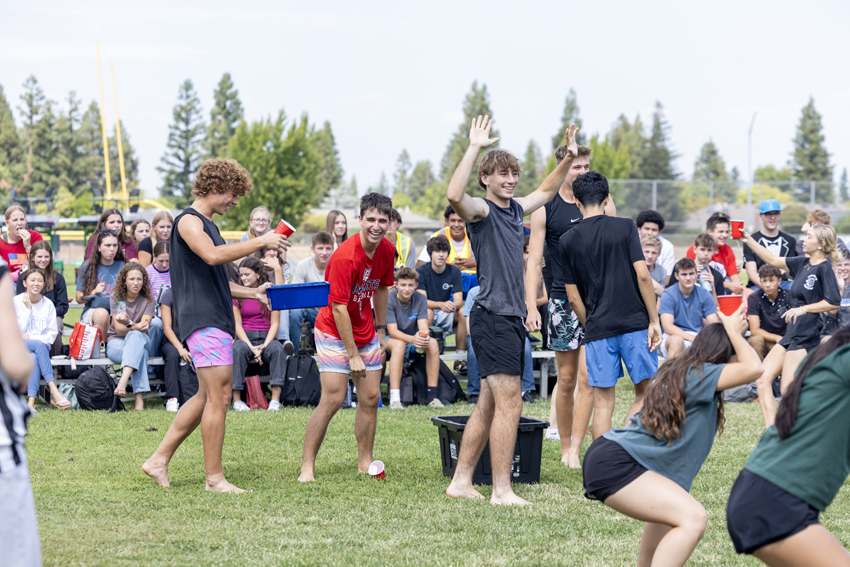Exclusive interview: Staffers attend conference, learn how to create trust in media
This article is republished from the 2018-2019 school year. Check out other republished articles on the front page to view The Feather Online’s accomplishments from last year. Regular Feather publication will resume Aug. 26, however, look for intermittent articles and social media posts each day.

Learning from the plethora of knowledge that professional journalists have gained, The Feather staffers attended the ‘Putting Fake News in the Rear View Mirror: How the Media Can Win Back the Trust of all Americans’ symposium at Fresno State, Feb. 26. They were empowered by what they learned.
Keynote speaker and Editor-In-Chief of ProPublica, Stephen Engelberg, used various social examples to present relevant topics that related media to current political situations. Previously holding editor positions at both The New York Times and The Oregonian, Engelberg originally moved to ProPublica as founding managing editor and now editor-in-chief.
Starting his current position at ProPublica in 2013, Engelberg explains how fake news came to be so prevalent in the media.
“Nowadays everybody can publish and that is good and democratizing,” Engelberg said, “but it also has a downside. The downside is that anyone can publish and not everyone who does publish has good motives. I think that’s where the root of this whole problem is. The monopoly of media has turned into a chorus of voices of all sizes and shapes, and for better or worse, people are going to take advantage of that; and that’s where we get fake news.”
Also on the Pulitzer Prize Board and Stephen Hamblett First Amendment Award recipient, Engelberg gave his keynote speech on the importance of restoring trust in the media.
Roger Tatarian chair and event organizer, Timothy Drachlis has been involved in numerous Pulitzer Prize-winning or Pulitzer Prize finalist projects. Before coming to Fresno, Drachlis was the Assistant Managing Editor at Newsday in Long Island. Drachilis shares his perspective on the damaging impact of fake news.
“I think what ends up happening with the fake news dilemma is that it blurs what is news and what is not,” Drachilis said. “What happens is when those accusations get thrown around by people who don’t necessarily know what they mean, it confuses people and then they are not as good of a consumer of information.”
The following tweet from Addison Schultz, features her interviewing Stephen Engelberg.
“The thing you want to do in fighting fake news is say how can we make sure that what we think is credible journalism is perceived to be credible.”
Really appreciated talking with @SteveEngelberg about fighting #fakenews at the Roger Tatarian Symposium. #thefeather pic.twitter.com/E2WzYz4zvr— Addison Schultz (@SchultzAddison) February 27, 2019
Drachilis lead the panel and encouraged the panelists to examine the subject of fake news. Starting off the event was Fresno Bee Executive Editor, Joseph Kieta. Kieta introduced the coming speakers and talked about his efforts to eliminate fake news, by becoming more transparent. Kieta advised this as a way to combat fake news.
One of the founder of the New York Times’ investigative unit, Engelberg shares his strategies for creating trust and establishing integrity.
“The more that you can be clear about where things come from and how you got to them, a lot more of your audience is going to believe you,” Engelberg said. “If you want to have any hope of convincing anybody, you want to have documentable, verifiable facts that hopefully someone is going to look at and be convinced.”
In addition, Engelberg has won two shared George Polk Awards, and co-authored pieces that were Pulitzer Prize finalists and Pulitzer Prize winners. Engelberg was followed by a panel, featuring senior national correspondent Scott Wilson of the Washington Post, AP news editor Juliet Williams and Sewell Chan, the deputy managing news editor of the LA Times.

As senior editor of The Feather, Addison Schultz, ’21, shares her unique perspective on fake news as a student journalist after both her and fellow Feather reporters were given exclusive interviews with the four media guests.
“I learned a lot from this event,” Schultz said. “Especially from Stephen Engelberg who I was able to interview before the event started. I learned a lot about fact checking and that you have to check your sources multiple times to ensure your own credibility. I also learned that you have to be transparent in your writing because you want your readers to be able to trust you. ”
In a study done by the Massachusetts Institute of Technology, fake news is 70% more likely to be retweeted. Fake news shared on media platforms often result in irrational actions. In 2016, false tweets were spread that told a story involving a Washington D.C. pizza joint and presidential candidate Hillary Clinton.
Those tweets in 2016 sparked outrage in a man who went to the restaurant and open-fired into the crowd using a rifle. Fortunately nobody was injured and the man was arrested, but this case is just one example of harmful fake news.
Drachilis also advises high school students to be wary of news, but to continue reading.
“I think the first thing that high school students have to do, is read stories from beginning to end and be skeptical of what they’re reading,” Drachilis said. “Then they can compare what they read in a one-versus-another platform. The more they do that, they’ll start to figure out for themselves what may sound suspicious or credible.”
The event was co-hosted by Fresno State’s Department for Media, Communications and Journalism, and The Institute for Media and Public Trust.
Jim Boren, Executive Director of the Institute for Media and Public Trust at Fresno State, helped to arrange exclusive interviews with The Feather. Sophomores and journalists, Addison Schultz, Morgan Parker, and Bryce Foshee were able to meet with the speakers and panelists for an hour before the event began.
Previously winning a Pulitzer Prize for a piece he co-authored, Chan moved to the LA Times from the New York Times in 2018. As Deputy Managing Editor, Chan recognizes the previous mistakes journalists have made and strives to correct them.
“I think that’s one of the things we have to talk about this evening,” Chan said. “Has the media done a good enough job to earn and keep the public’s trust? And in many cases, clearly, the answer must be no. And so what can we do better to earn and keep that trust, and also what do we have a right to expect from our leaders and from our communities in terms of their trust and their level of expectation around trust.”
The following podcast features Scott Wilson expanding his views of fake news to Feather reporter Vijay Stephen.
National Headliner Award Recipient, Williams serves as the San Francisco News Editor for Associated Press. Williams shares how the public’s natural tendencies help support fake news.
“I think people didn’t even know that they were getting news personalized for them,” Williams said. “And people want their opinions reinforced and so people have naturally self-segregated and chosen to read things that reinforce what the believe in. And it’s partly the media’s fault. We failed to see it coming and the newspaper industry failed to see the decline in its own industry in time, so now we have to catch up and show our worth.”
Previously working with figureheads such as former President Barack Obama, and meeting Nobel Peace Prize Laureate Mr. Elie Wiesel, Wilson expresses his concerns with fake news.
“I think fake news has huge impact,” Wilson said. “When people are confused about who they are hearing, and learning and they can’t trust that, it complicates our ability as a country to make the right decisions. If you are told something and then the next day find out that it is false, then the next time you read anything you are going to question it regardless of the source. It is extremely detrimental and I think that the media has a big responsibility in being right and being fair.”

The Roger Tatarian Journalism Symposia are conferences and lectures sponsored by Fresno State that aim to initiate interactions between students and journalism professionals.
During Engelberg’s time at The Oregonian, it received a Pulitzer Prize for breaking news, and was a Pulitzer Prize finalist. Engelberg shares how journalists need to evolve with the times in order to reach a wider audience.
“We have to rethink how people are getting news,” Engelberg said. “News used to be that people would sit in front of the T.V. and watch the 6:30 T.V. news. Most families don’t do that anymore. People don’t read their newspapers anymore. People are now getting their news online, through social media, and people sharing things. So there is more news than ever out there today. People are getting their news through so many different mediums and we have to acknowledge that.”
With a master’s degree in politics from Oxford University, and being first in his family to finish college, Chan addresses the source of young people’s wariness of the media.
“I think the challenge that I see among young people is that they have been trained to be skeptical,” Chan said. “Which is good, because you should be skeptical. But there is a difference between skeptical and cynical. And I think that’s something to think about. And I also think that your generation probably has yet to develop very strong relationships with trusted news sources. Partly because we in the media have not done a good enough job of showing why we deserve to be trusted, but also showing the distinctions among different news outlets.”

Previous president of The Sacramento Press Club, Williams explains how fake news will always surface despite the media’s best efforts.
“I don’t think any effort to thoroughly debunk anything will ever truly work,” Williams said. “There will always be people who want to believe in conspiracy theories. But good journalists can keep doing a good job, and that’s the best solution that there can ever be.”
With many awards, such as the Gerald R. Ford prize for Distinguished Reporting, and the Inter American Press Association award, Wilson examines the deeper issues within fake news.
“Fake news is focused on division,” Wilson said. “It isn’t informing. It wasn’t telling the truth; and it was designed to do one thing, which is pit people against each other. It also confuses the atmosphere, which makes people question what they know and how they learned it. I think that is the real threat of it, and it is not real anymore and that is not journalism, it’s propaganda.”
Meeting with Fresno County leaders such as Chief of Fresno Police, Jerry Dyer over the last two weeks, Schultz addresses the increase of fake news liabilities within students.
“I see fake news as something to be fought against and something that more people need to be aware of,” Schultz said. “Students come to school carrying all sorts of opinions and backgrounds and those things affect the way they interpret news. I think as a journalist it is our job to inform our peers about the importance of truth and the fact that not everything they read on the internet is true.”

Fresno State Institute for Media and Public Trust will host it’s next event, ‘Science Journalism in the Age of Mistrust’, April 9. The event will be held in the Peters Educational Center, admission is free and the event starts at 6 p.m.
The Keynote speaker, Deborah Blum, is a Pulitzer Prize winner and Director of the Knight Science Journalism program at the Massachusetts Institute of Technology and will headline the event. Support the Fresno State Media, Communications, and Journalism department by attending.
Everybody can combat fake news by verifying sources and stories before sharing a story. Keep news truthful by making sure what your reading is correct and responding appropriately to fake news. Make an effort to seek out opposing point-of-views and find reputable fact-checking websites.
The Feather appreciates comments and opinions both in the comments section below or via a column or letter to the editor. Share where you get your news, examples of fake news and how you avoid being duped.
For another article, read Breaking: Community reaches out for Kids Day, March 5, or Coach returns to lead team, looks to expand gold season. For more on the subject, read Editor-in-Chief at ProPublica discusses the issue of ‘fake news’.
Vijay Stephen can be reached via Twitter and email.





Alyssa Reese • Mar 8, 2019 at 11:16 am
Great article, Vijay!
Addison Schultz • Mar 7, 2019 at 9:02 am
This was such an informative event! It was so cool to meet professional journalists and learn from some of the best. Great article!
Julia Fikse • Mar 7, 2019 at 8:06 am
Amazing article!!!